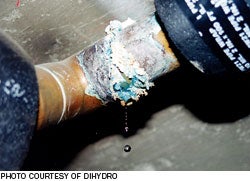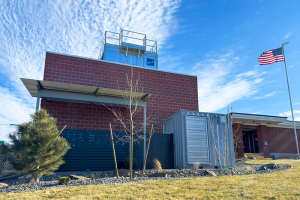Water treatment solves piping leak woes at hospital
 |
| Water treatment programs can stop corrosive pipe leaks. |
A water treatment program has enabled a Midwest university hospital to save up to $19 million by restoring rather than replacing copper pipes that had corroded due to excessive chlorination and developed hundreds of pinhole leaks.
The leaks began to develop in the hospital's piping system in March 2006, only three years after it was built. The hospital also began a supplemental chlorination treatment program to purify discolored water apparently caused by particles and debris entering the system due to nearby construction.
As the number of pinhole leaks began to increase and the chlorination treatment failed to fix the water purity problem, the hospital started replacing sections of corroded pipe. Over a three-year period the number of leaks increased from a few to about 275, with about 12 new leaks developing each month.
Eventually, the hospital hired a water quality and piping maintenance company, DiHydro Services Inc., Sterling Heights, Mich., to help with the problem. In April 2009 the company instituted a program to treat the hospital water system with calcium and a food-grade silicate, which neutralized the corrosive effects of the hospital's chlorination treatment plan.
After DiHydro modified the water's pH and hardness and took over the supplemental chlorination program, the number of leaks began to decrease. The hospital reports that there are no pinhole leaks at this time and the water purity has been restored.




